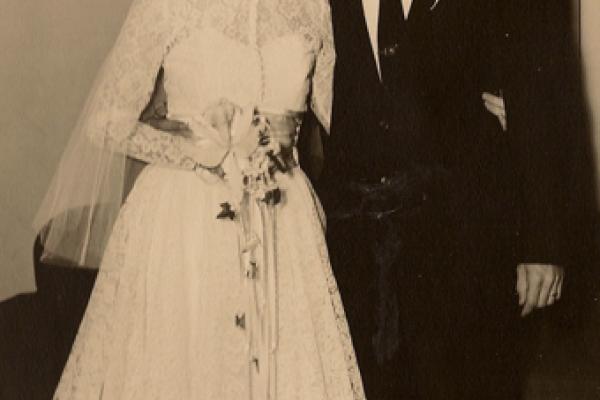Philip Weeks fondly remembers the days when his wife of 56 years, June, was a nurse and an artist whose paintings were compared to Rembrandt's.
Her paintings still hang in their home in Lynchburg, Va., but almost everything else has changed for the couple after she was diagnosed with possible Alzheimer's and then an abrupt form of dementia.
In one moment, the retired Charismatic Episcopal bishop said, she would lean over to kiss him. "An hour later, she looked at me and said, 'Who are you?'" he recalled.
When the person you married goes through a dramatic change, what's a spouse to do? As Valentine's Day approaches, clergy, ethicists and brain injury experts agree: There are no easy answers.
When a couple is faced with the sudden or gradual change in the person who now may no longer be able to give flowers or go out to the movies, it often means a new definition of love.
"I made a vow," said an emotional Weeks."For better or for worse, in sickness and health. She has stood by me in mission work, in the pastorate. Why can't I stand by her now?"
Several recent examples reflect the complexities of love in medically challenging situations:
- Last summer, religious broadcaster Pat Robertson initially suggested on his "700 Club" program that a man divorce his wife who had Alzheimer's and "start all over again" with dating. Alzheimer's, he said, was "like a walking death." He later said he was "misunderstood."
- In early January, The Washington Post Magazine ran a story about a woman whose husband suffered a traumatic brain injury after a heart attack. She eventually decided to divorce him but continue caring for him with her second husband.
- On Friday (Feb. 10), The Vow hits movie screens, an adaptation of a rereleased book about a young married couple whose serious car accident left the wife unable to recognize her husband. In fact, she thought she was not married.
"There's always an obligation, I think, to keep faith with your spouse but the shape that that can take, morally speaking, can vary," said Darlene Fozard Weaver, an ethicist at Villanova University in Pennsylvania.
When medical crises interrupt a couple's expectations of wedded bliss, there are all kinds of dynamics to consider: Is the ill spouse now abusive? Can the still-well spouse manage the necessary care?
Although The Vow is a romantic drama about trying to get a wife to fall in love with her husband again, Fozard Weaver said it's not far from what real-life marriage — with health challenges or not — is all about.
"Keeping faith in a marriage is always this ongoing process of both remembering what brought you together in the first place but also responding to and embracing the person who's here before you now," she said.
The film is based on the real-life story of Kim and Krickitt Carpenter after the couple was involved in the 1993 car accident. Physical therapist Scott Madsen watched the husband move from caretaker to coach to eventually, an again accepted mate.
"As she got better, then the relationship became better as well, more of a normal relationship," said Madsen, who served as best man when the couple renewed their vows in 1996.
Kim Carpenter writes in the book The Vow that some people suggested divorce, saying it might even help with medical expenses. That was not his choice.
Greg Ayotte, director of consumer services for the Brain Injury Association of America, said there's a misconception that most spouses of brain-injured patients — people who have been in a car accident, or had a fall, stroke, or tumor — head to divorce court. According to two recent studies, the vast majority of married brain-injured patients remain wed.
"In the world of brain injury, the term often used is 'new normal,'" he said. "As you begin to understand the injury, you kind of develop a new normal for your life and your family."
Page Melton Ivie, the subject of The Washington Post story, said faith played a role in her decisions on how to best care for her first husband, Robert Melton.
"In the context of my faith, I am standing by him and with him," she wrote during an online chat after the story was published. "I am fortunate to have found someone who will share this with me."
Others didn't look at it that way.
"Some day she will have to stand before God and explain why she put herself before her vows to God and to Robert," wrote Dennis Babish, a blogger for Prison Fellowship's Breakpoint Blog.
Terri Corcoran, a spokeswoman for the Well Spouse Association, said members on her organization's online forum also were divided. Some called it a "beautiful story" that gave them hope, while others criticized their "have your cake and eat it, too" relationships.
Corcoran's husband, Vince, has a neurodegenerative disorder that leaves him mostly speechless. Corcoran said her conversion to her husband's Catholic faith helped her carry on.
"I've learned to accept the way things are," she said. "I still would give anything to have him normal again even for a day. I just keep saying, 'Lord this is your will. I know you will show me other blessings' and he has."
Weeks, who has self-published a book called A Long Dark Night: A Caregiver's Journey with Dementia, said he came close to losing his faith, but not his love. Eventually, he said, he stopped doubting God.
"He was giving me a quality of love for her that I did not have before," the bishop said of his wife. "I think I'm a better husband now because I've learned how to deal with this."
Got something to say about what you're reading? We value your feedback!
